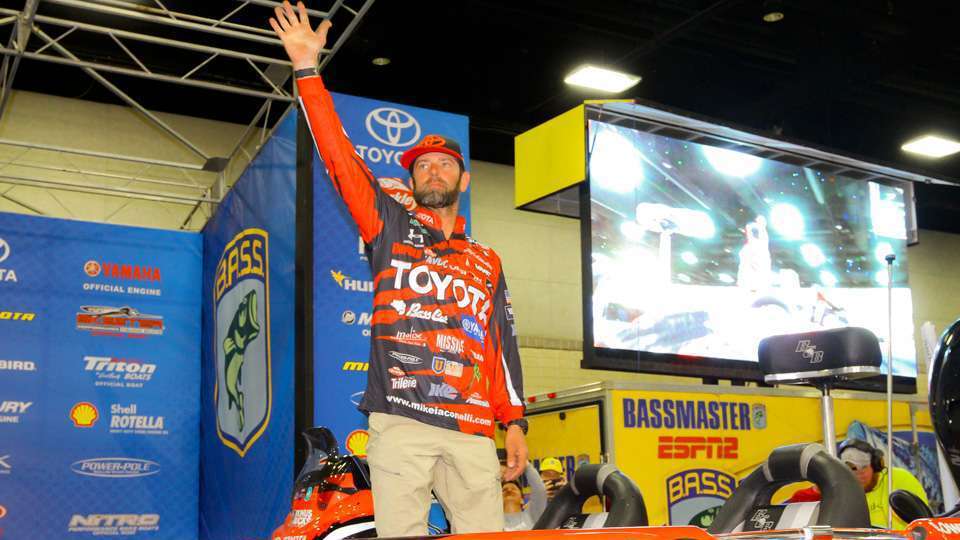
You could forgive Mike Iaconelli if he felt he had a grudge to settle with Lake Conroe, site of the 2017 Bassmaster Classic. He’s done well there before on multiple occasions, but it was also the of one his greatest career near-misses, when he lost a sudden-death fish-off in the 2011 Toyota Texas Bass Classic to Keith Combs. While he was emotional about it at the time, six years later he’s more hopeful than upset.
“Lake Conroe likes me,” he said. “I’ve had lakes over the years that have hated me. Douglas is one of them. But there are also certain lakes you get along with. There’s something about Conroe. Every time I’ve been there I’ve caught one over 8 pounds in the tournament. That’s a confidence booster.”
While acknowledging that he’s passionate on the water, Iaconelli said that the emotional flare-ups that the public sees or hears about are the beginning and the end of his frustration. “I get rid of it pretty quickly,” he said. “There’s that little outburst and then I’m done with it.”
While he’ll treat the emotional side of the 2011 TTBC as ancient history, he’ll rely on the process that got him to the point of being able to contend for the win. It’s the same process that he’s employed in every major championship he’s qualified for since his first Classic in 1999, the same strategy that has put him in the top ten in eight of the 17 Classics he’s fished, including a win in 2003 on the Louisiana Delta.
“It starts with research about the fishery and then three to five days of doing a little scouting,” he said. “I spent three and a half days there in mid-December. I just idle the entire lake, look at the bottom contours and explore how to get into shallow places. I’ve been to Conroe before, but never at this time of year. In the past it’s always been post-spawn to fall. This will be my first time in March, and they’ll be in some phase of the spawn — pre-spawn, spawning or post-spawn — so they should be shallower than they normally are when I’m there. In my history, the majority have always been in 10 feet of water or greater. This time the majority should be 10 or shallower, so my strategy will be altered.”
With the scheduling change from February to March the weather should be more temperate than that experienced in some more recent Classics. Iaconelli said that “in selfishness, my kind of Classic would be temperatures in the twenties or thirties, in the dead of winter,” although the one Classic he’s won took place in the heat of the Louisiana summer. Either way, the sole goal is “finding the winning fish.” At the season opener at Cherokee he had what he characterized as “a really bad practice” and went into recovery mode before cranking out an impressive 11th place finish. At the Classic, he knows, it’s all or nothing.
“I’m not looking for thirty 2-pounders,” he explained. “I’m looking for five over 4 pounds. The main thing is to try to put myself in position to win, and if that doesn’t work let’s get to the next one.”
It has now been nearly 14 years since Ike’s lone Classic win, 11 since his Angler of the Year title, and this summer will mark three years since his most recent Elite victory at the Delaware River if he doesn’t win one before then. He’s constantly in the hunt or nibbling around the edges, with huge numbers of top twenties, and he hasn’t missed a Classic since 2001. While he yearns for more victories, he’s not necessarily shocked that he hasn’t been on the receiving end of another shower of Classic confetti.
“I’m still surprised that I actually won one,” he said. “Everything’s got to go perfectly. Everything has to swing in your favor, and you only get one chance a year, if you even get there. When you’re going to win, you win. At the Delaware River, there was nothing I could’ve done wrong.”
As he approaches his forty-fifth birthday, Iaconelli is remarkably philosophical about winning again. While he’d like for his two youngest children to see him hoist a Classic trophy for the first time, he noted that at the Delaware River, “with all of my kids there, it filled that void.” If anything, he added, the long, diligent struggle to claim another championship “will teach them the realistic nature of competition.” On the verge of fishing his eighteenth Classic, Ike is satisfied with where the process has taken him: “When I was 15, 16 or 17 years old, my goal was to one day make a Classic. Then you make your first, and you want to make another. Then you want to win one. My goals have already been accomplished. Everything I’ve ever wanted to do has already happened.”
Nevertheless, he noted that there’s “plenty of room” in his house for another Classic trophy and he hopes that he leaves Conroe feeling that it likes him as much as he likes it.

